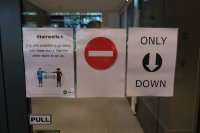Mol and Bregt provided further information on the corona measures for the university during the coming academic year.We start off with a correction. In our previous interview with Arnold Bregt and Arthur Mol in Resource, Mol stated that there would be no catching up on courses over the summer vacation. In the English edition, however, the text states that there will be no resits. This is a translation error and is incorrect. Mol clarifies: ‘There will be resits as is customary in August. This time, however, these exams will be held online.’

Over fifty participants (students and employees) joined the 45-minute online Q&A on Monday, 8 June. Questions were submitted prior to the event, and further questions were asked during the live session through chat—a summary.
1) Will student working groups be able to meet again on Wageningen Campus this month?
‘The student workgroups are currently doing their assignments online, and can complete their reports in this way’, says Arnold Bregt. ‘We can, however, imagine that they might hold their presentation at the end of period six on campus. Even one or two interactive meetings with their teacher may be feasible, but we do not want everyone returning to the campus this month. Students can consult with their mentor to discuss whether or not they can meet this month.’
2) There are students who report online classes are causing them issues; it requires too much energy, their motivation is negatively impacted, and they miss interacting. Can WUR remedy this in some way?
‘We too would prefer much more face-to-face education on campus, but the situation made that impossible over the past months’, says Arthur Mol. ‘The course evaluation of period 5, which took place entirely online, did not show students to be dissatisfied or ill-motivated. Our courses were evaluated by the students in a similar way as the same period the previous year.’
3) I read that first-year students will be prioritised for education on campus in the new academic year. I’m a masters student and have barely been on campus since February. Can I be given precedence too?
Mol: ‘Fair point. I think this group of students should also be offered priority for on-campus education, as they have barely been able to get to know each other or us in an interactive, face-to-face course setting. The general rule will still apply that large-scale courses will take place online, and practicals and working groups will be held on campus if possible.’
4) Undergraduates will possibly be able to come to campus more frequently next year to discuss their thesis with their supervisors. Does this imply that researchers will also be spending more time on the campus?
Mol: ‘That would be nice. However, not all employees will be able to work on campus due to the social distancing rule of one and a half metres. We must prioritise. In doing so, we distinguish between employees that need to be on campus, for example, because they teach or research in a lab facility, and employees who want to come to campus because they want to meet and talk with students. In any event, the presence of staff on campus will have to be planned. Perhaps having half of one chair group present in the mornings, and half of another in the afternoons could be a solution.’
5) I am preparing a course for period 1 of the new academic year. How much online education should I include?
‘We estimate that some 25 to 30 per cent of education can take place on campus. This week we are done corona-proofing our practical locations. In the coming month, we will be testing how many students we can admit to practicals. Based on this experience, we will adjust the course schedule, which will give us a better idea of what courses we can offer on campus.’

6)The online exams have taken place, and the online supervisors have reported possible cases of fraud. These cases must now be assessed by the teachers and the examination committee, but they lack experience in online exams. What now?
Bregt: ‘I don’t yet have a solution. Possible fraud in online exams is a difficult issue. We are currently evaluating the exams with the programmes and will discuss dubious cases with the examination committee. There is a protocol on how to handle indications of fraud.’
7) The corona crisis has students, especially international students, stuck in their rooms. We underestimate the effect this has on them. The lack of contact and outdoor space results in an increase in psychological issues. How is the university helping?
Mol: ‘A very relevant point. This is one of the reasons we want to get international students back on campus as soon as education on campus is possible again. Social factors are relevant in determining who gets access to campus and when. We are also discussing with student associations on how they can involve international students in more recreational activities on- or off-campus.’
8) Has the executive board consulted with students about the measures?
Mol: ‘At the start, students were not involved in the policies. After the Dutch government declared the universities were to close, we needed to act fast and take emergency measures. We pulled together a crisis team that did not involve students. During the first month, I had weekly meetings with the chair of the student council. But that was about it. Now, student involvement is as you would expect. The Student Council is involved in discussions on WUR’s corona measures, and students discuss the measures for the different programmes in our Board of Education and programme committees.’
9) As a student, I paid tuition for regular education, but I have been stuck at home following online courses. Will I get a reduction?
Mol: ‘No, you will not get a reduction for online education. This is a valuable form of education that our teachers have worked hard to provide. We are looking into forms of compensation if the corona crisis causes students to fall back. This is something the association of universities has discussed with the Ministry of Education.
‘Dutch and EU-students that can prove they have fallen back as a result of the corona crisis will get a waiver for three or four months tuition fee. WUR is also looking into how we can help non-EU international students who fall back by a reduction of their tuition fees.’
Bregt: ‘And, for students experiencing dire financial issues due to the corona measures, an emergency fund is available.’
10) I live outside Wageningen. Will the measures for me differ from those for students living in Wageningen?
Mol: ‘Public transportation is the main bottleneck for the coming academic year. Trains in particular. The universities want the government to ease the travel restrictions that apply to students – allowing classes only between 11.00 and 15.00 hrs. We want more flexibility. We know that first-year students continue to live at home more frequently, and want to help them by scheduling first-year courses on campus later in the day. Moreover, we recommend that students travel by bike or car as much as possible. This may sound a little strange in light of our policy on sustainability, but at this stage of the corona crisis, we have no choice.’
11) I want to start studying Environmental Sciences in Wageningen this year. Will I be required to be present in Wageningen in September?
Bregt: ‘The first period for this programme is mostly online, with large-scale lectures. It will be possible to start the programme at home. From November, when more practicals and small-scale interactive courses are included in the programme, it would be better to live in Wageningen. However, this differs per programme; we will provide more information soon.’
12) I will start my masters’ thesis in September. Will I be able to meet with teachers and fellow students on campus?
Mol: ‘We will not be checking up on you, but we hope that you will come to the campus only if absolutely necessary and that you will not use too much space for too long. I would recommend you discuss your thesis with your supervisor every two weeks, and ask him/her whether there is added value in discussions on campus, for example, with a thesis group. We are not saying: stay away. We trust you to make use of the limited space responsibly.’
13) How can students voice their suggestions or criticism regarding the WUR corona measures?
Mol: ‘In several different ways. Suggestions for courses or programmes can be directed at the programme committee. The Board of Education is available for broader suggestions for Wageningen education. And through the Student Council, which discusses education with the executive board intermittently. You can choose from three student parties that make up this council.’
Want to review the Q&A with Arthur Mol and Arnold Bregt? Check it out here.

